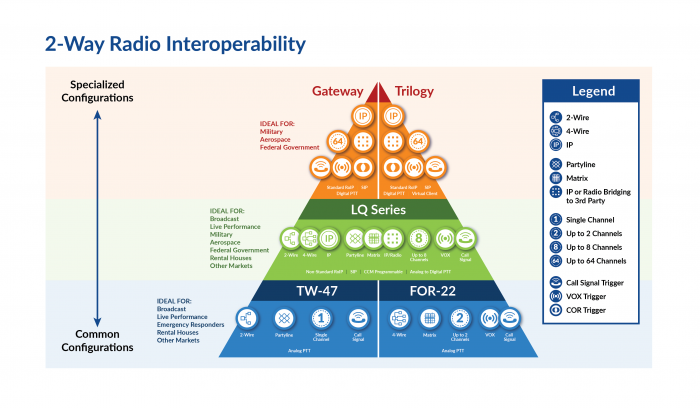For intercom users who are connecting across departments, municipalities or far beyond to countries around the globe, the ability to interface with two-way radio is often essential. Two-way radios are key to operations of all sizes and levels, and an increasing number of users are seeking to connect these communications with intercom, partyline or matrix systems. Intercoms can enhance and extend the usability of two-way radio systems as well as providing the infrastructure for connecting them to other communications systems, including other radios.
Bridging audio between intercom and two-way radios streamlines operations and provides vital connection across a number of applications. These interoperability needs are as specific and unique as the users who depend on them. Fortunately, there are a multitude of solutions for everything from a two-channel (or RF frequency) setup to a global IP network of thousands.
There are several ways to integrate two-way radios into a Clear-Com® device. In addition to the pin-outs for Clear-Com products, visit this page our Solution Finder to find the pin-outs for various radio manufacturers.
Two-way Radio Applications
- Network Operations Centers (NOCs)
- Tactical Operations Centers (TOCs)
- Security Operations Centers (SOCs)
- Emergency Operations Centers (EOCs)
- Public Safety Dispatch
- Shipping & Logistics
- Transportation Management
- Warehousing & Fulfillment
- Event/Venue Security
- Janitorial
- Mining
- Big Box Retail
- Industrial
- Education & Campus Security
- Construction
- Test & Evaluation/Research
- Energy
- Customer Flow/Queue Management
- House of Worship (HOW)
- Shipbuilding/Dry Docks
- Medical Campus
Baseline Interoperability
A simple method for integrating analog 2-wire partyline intercoms to two-way radios is with the Clear-Com analog two-port TW-47 interface module. This provides basic functionality enabling two-way radio users to talk and listen to analog partyline intercom communications. For mobile broadcast, theater production and rental team members, who often prefer the two-way radio workflow, this basic interoperability provides access to the cues they need.
Mission-Critical Applications
Within Clear-Com's mission-critical business to Government, Military and Aerospace applications many use-cases for two-way radio interoperability are based on our IP gateway solutions coupled to the Eclipse® HX digital matrix intercom and other intercom platforms. These platforms allow fixed users using intercom hardware to communicate to field two-way radio users in vital situations.
With an Ethernet-based Clear-Com LQ® Series interface, multiple two-way radios can be added into an audio stream with any intercoms also connected. These signals can be transported over IP anywhere worldwide by 'linking' up to five LQ Series interface. It enables push-to-talk (PTT) functionality to key radios.
Originally developed for remote broadcast, these IP technologies are well suited for command center operations. Within incident command, an LQ interface can efficiently and effectively connect all communications between a mobile command center and the emergency operations facility. Furthermore, within an LQ device Clear-Com offers its Agent-IC® Mobile App which enables cell phones and tablets to be used for all communications.
Specialized Command
For specialized two-way radio interoperability applications, Clear-Com provides two-way radio integration with its LQ Series, Gateway or Trilogy Mercury offerings. These provide the features of Radio-over-IP (RoIP), digital PTT, as well as SIP client capabilities to tie in VoIP telephone systems.
In mission-critical scenarios where emergency vehicles may have disparate UHF, VHF, SAT radios and a channel bank of portable two-way radios these Clear-Com technologies allows the Communications Unit to connect those signals into an audio intercom matrix to provide centralized access to every channel. Connected to the intercom matrix, Clear-Com offers multi-key user intercom stations for direct access to any Command System sector.
Ready for the Future
The flexibility of Clear-Com two-way radio interoperability integration helps to provide future-proofing in times of rapid technological change. As communications become more decentralized, the IP network options and high-quality audio will ensure that message are delivered with efficiency and clarity.
